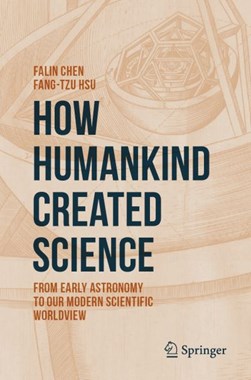-
BROWSE 1000s OF BOOKS IN STOCK
-
FREE DELIVERY ON ORDERS OVER €10
How Humankind Created Science
PAPERBACK
The development of science has been an ideological struggle that lasted over three millennia. At and after the times of the Babylonian Empire, however, the pace of scientific evolution was painfully slow. This situation changed after Copernicus kick-started the Scientific Revolution with his heliocentric theory. Newton's law of universal gravitation transformed natural philosophy, previously focused on mythology and abstract philosophical thinking, into an orderly and rational physical science. Einstein's redefinition of space and time revealed a new and central principle of the Universe, paving the way for the huge amounts of energy held deep inside physical matter to be released. To this day, many of the our known physical theories represent an accumulation of changing knowledge over the long course of scientific history. But what kind of changes did the scientists see? What questions did they address? What methods did they use? What difficulties did they encounter? And what kind of persecution might they have faced on the road to discovering these beautiful, sometimes almost mystical, ideas? This book's purpose is to investigate these questions. It leads the reader through the stories behind major scientific advancements and their theories, as well as explaining associated examples and hypotheses. Over the course of the journey, readers will come to understand the way scientists explore nature and how scientific theories are applied to natural phenomena and every-day technology.
€40.59

121 Reward Points
In stock online
Extended Range: Delivery in 2-3 working days
Extended Range: Delivery in 2-3 working days
Free Delivery on this item
Any purchases for more than €10 are eligible for free delivery anywhere in the UK or Ireland!
The development of science has been an ideological struggle that lasted over three millennia. At and after the times of the Babylonian Empire, however, the pace of scientific evolution was painfully slow. This situation changed after Copernicus kick-started the Scientific Revolution with his heliocentric theory. Newton's law of universal gravitation transformed natural philosophy, previously focused on mythology and abstract philosophical thinking, into an orderly and rational physical science. Einstein's redefinition of space and time revealed a new and central principle of the Universe, paving the way for the huge amounts of energy held deep inside physical matter to be released. To this day, many of the our known physical theories represent an accumulation of changing knowledge over the long course of scientific history. But what kind of changes did the scientists see? What questions did they address? What methods did they use? What difficulties did they encounter? And what kind of persecution might they have faced on the road to discovering these beautiful, sometimes almost mystical, ideas? This book's purpose is to investigate these questions. It leads the reader through the stories behind major scientific advancements and their theories, as well as explaining associated examples and hypotheses. Over the course of the journey, readers will come to understand the way scientists explore nature and how scientific theories are applied to natural phenomena and every-day technology.

121 Reward Points
Any purchases for more than €10 are eligible for free delivery anywhere in the UK or Ireland!
€40.59

121 Reward Points
Any purchases for more than €10 are eligible for free delivery anywhere in the UK or Ireland!
Product Description
The development of science has been an ideological struggle that lasted over three millennia. At and after the times of the Babylonian Empire, however, the pace of scientific evolution was painfully slow. This situation changed after Copernicus kick-started the Scientific Revolution with his heliocentric theory. Newton's law of universal gravitation transformed natural philosophy, previously focused on mythology and abstract philosophical thinking, into an orderly and rational physical science. Einstein's redefinition of space and time revealed a new and central principle of the Universe, paving the way for the huge amounts of energy held deep inside physical matter to be released. To this day, many of the our known physical theories represent an accumulation of changing knowledge over the long course of scientific history. But what kind of changes did the scientists see? What questions did they address? What methods did they use? What difficulties did they encounter? And what kind of persecution might they have faced on the road to discovering these beautiful, sometimes almost mystical, ideas? This book's purpose is to investigate these questions. It leads the reader through the stories behind major scientific advancements and their theories, as well as explaining associated examples and hypotheses. Over the course of the journey, readers will come to understand the way scientists explore nature and how scientific theories are applied to natural phenomena and every-day technology.
Product Details
ISBN9783030431341
FormatPAPERBACK
PublisherSPRINGER (28 April. 2020)
No. of Pages582
Weight920
Language English
Dimensions 235 x 155 x 38

